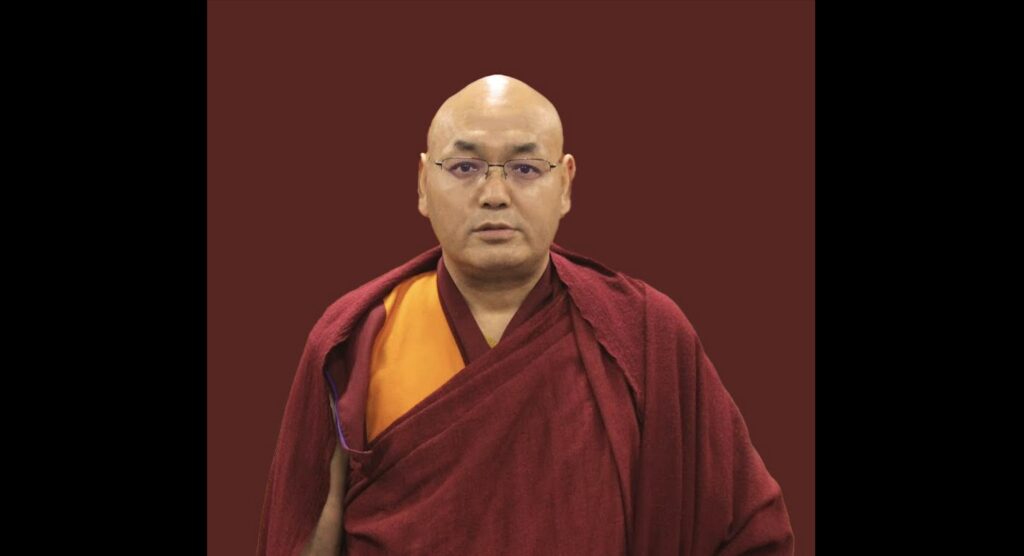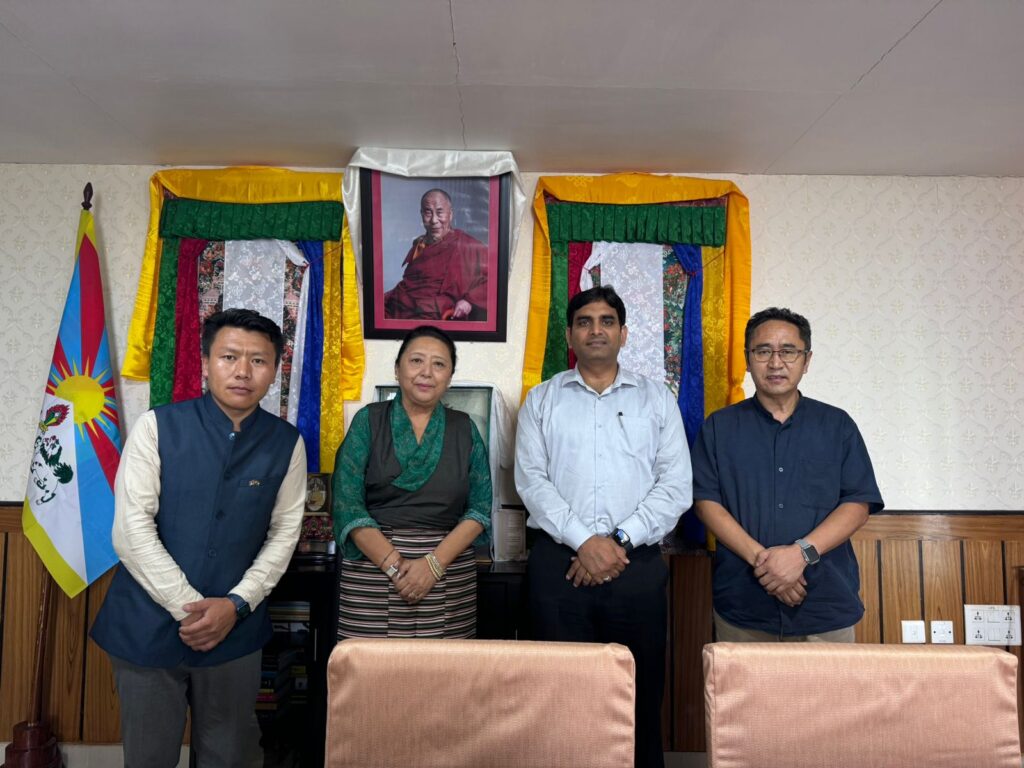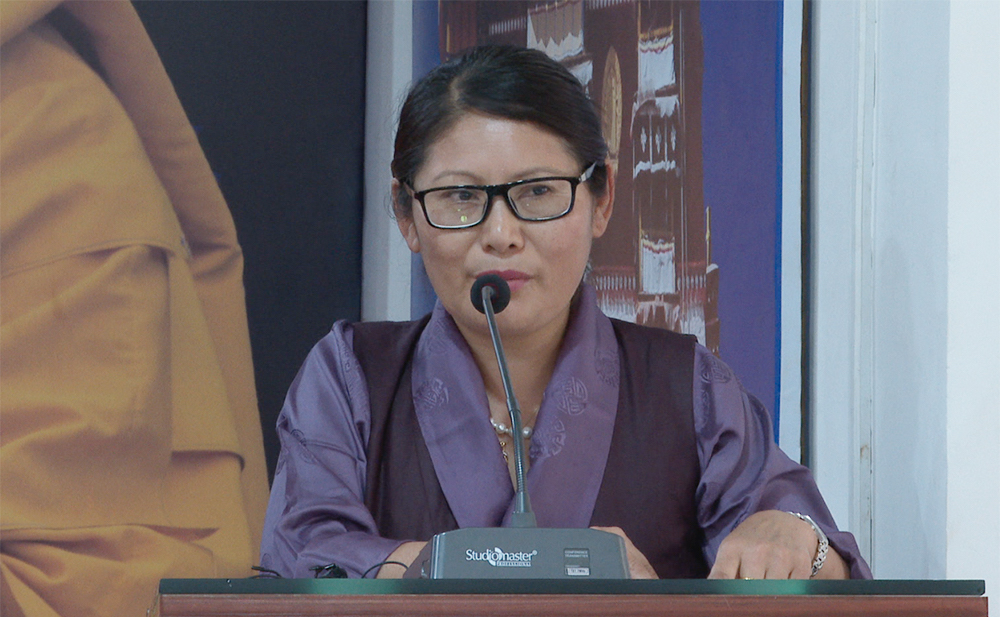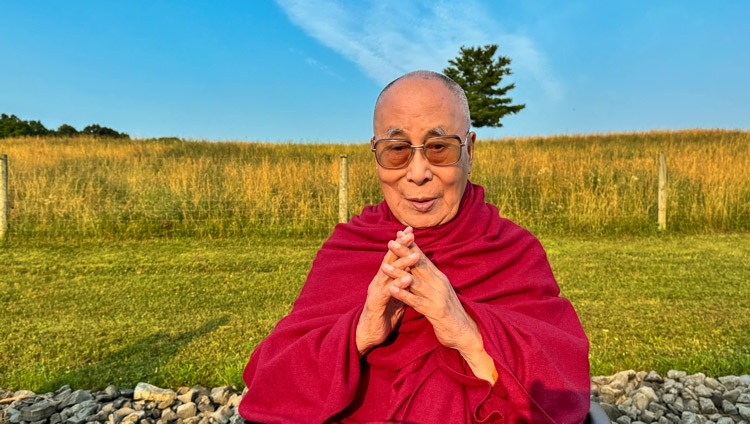Sikyong Dr Lobsang Sangay Speaks Exclusively On India-China Standoff
WATCH FULL INTERVIEW: CTA President Dr Lobsang Sangay speaks exclusively on India-China Standoff with Rahul Kanwal on India Today, 9 June 2020.
Posted by TIBET TV on Tuesday, 9 June 2020
Dharamshala: As the border stand-off between the Indian and Chinese armies has flared up once again, the last time they were engaged in a similar stand-off was in 2017 over the Dokhlam plateau.
While the media reports that the border skirmish has been triggered by the infrastructure activities carried out by India along the LAC, however analyst like Ajai Shukla, Indian Defence Analyst fears that “China wants the border problem to linger” to keep India off balance and “prevent from focusing its attention on Tibet, where China is in the deep problem[s].”
The Central Tibetan Administration, however, been warning India and other neighbouring countries for the last 60 years what China is capable of.
The President of Central Tibetan Administration, Dr Lobsang Sangay spoke in length his perspective on the India-China border dispute in an exclusive interview with Rahul Kanwal of India Today.
Excerpts of the interview:
Rahul Kanwal: What do you make of the current face-off between Indiana and Chinese armies as it is largely taking place on the India-Tibet border? As the leader of the Tibetan government in exile, how are you viewing these developments between the two large standing armies of the world?
Sikyong Dr Lobsang Sangay: We have been saying it for the last 60 years what happened to Tibet could happen to you. That is to India and all the neighbouring countries of Tibet. Now clearly from the border incursion to influences in the neighbouring countries, you can clearly see what has happened to Tibet is happening now. Since the occupation of Tibet, China is trying to expand its influence to the South Asian region as well and till you solve the issue of Tibet, the border incursion and all these problems and tensions will remain.
Rahul Kanwal: What are you making of the recent aggression adventurism from the Chinese government whether it is along the India-Tibet border whether it is in the South China sea whether it is with Taiwan whether it is with the various other countries in the East Asian region. How are you as the leader of the Tibetan government-in-exile are viewing this increasing adventurism and militarism that we are seeing from the Chinese government?
Sikyong Dr Lobsang Sangay: The recent adventurism is a part of their expansionism design and politically whenever you have internal tension or problems you want to distract it by raising external problem and external challenges and hence you can see from South-China Sea to Hong Kong to Taiwan and 3488 km long border between Tibet and India. Having said that, after Tibet was occupied the Chinese leaders including Mao Tse Tung have said Tibet is the palm and the five fingers are Ladakh, Sikkim, Nepal, Bhutan, and Arunachal Pradesh. They have taken over the palm and now they are taking over or penetrating to all these five fingers. This is exactly what is happening in Ladakh. This is part of their grand old strategy for 60 long years and the recent tension is they are coming under enormous international pressure given the Wuhan originated pandemic you know countries are blaming them, WHO included 130 signed off to investigate the origin of the coronavirus which obviously is from the city of China.
Rahul Kanwal: You spoke about the internal condition in China you have so many Tibetan people who are still in touch with you and your associates. What is the picture that you are able to draw about the kind of dynamic that set play in mainland China in Tibet at this time? What could this suggest about the kind of pressure that Xi-Jinping and the Chinese government is facing?
Sikyong Dr Lobsang Sangay: You know when you don’t come through a democratic process which is at the moment it is a one-party totalitarian system so there is an element of insecurity and paranoia. latest that we hear in Tibet no one is allowed to visit Tibetan monasteries. Monks and nuns even to venture outside the monasteries, they need local permission and if you want to venture outside the state you need state-level permission just for travel so what they are trying to do is absolute control over the Tibetan plateau because they don’t want any kind of tension. This clearly shows you that the Chinese leadership is bitten a jittery mood hence they are clamping down on Tibetans as we speak even though this month is Saga Dawa (the holiest month for Tibetan Buddhism). This is the month where monks and nuns are allowed to be in the monasteries allowed to travel. Tibetans are allowed to visit monastic places but the Chinese government is putting so much pressure at this moment. This shows that they are bit nervous as we speak.
Rahul Kanwal: Can you give us a sense of what you are hearing about the military build-up along the India-Tibet border? On the one side, you have spoken about how people in Tibet are being denied their basic rights.. A lot of videos have emerged in the public domain which seems to be suggesting multiple military maneuvers and build-up on the Tibetan side of the border. What are you hearing?
Sikyong Dr. Lobsang Sangay: We have been saying this for a long time when the Chinese government promised us to build one road connecting China to Tibet, they promised us prosperity and stability but hat road was you know used to bring trucks of guns, and tanks to occupy Tibet and since that time the one road has become a hundred roads connecting all over Tibetan plateau including the borders of India. Now they have built 30 airports including 6 military airfields in neighbouring Arunachal and Ladakh and various places in Tibet. And now we also that ICBM Inter-Continental Ballistic Missile was stationed in and around Tibetan plateau so all these military build-ups have been taking place for 60 years even the railway line that has connected from China to Lhasa now coming to Shi Ga Tse to the border of Nepal the railway tracks are of high military-grade which could bring equipment obviously for war. So the whole of Tibetan plateau is militarised hence His Holiness Dalai Lama has been saying, the permanent solution to this border tension can be found in Tibet is made into a zone of peace and the border is demilitarised because as per history forget about the military there was no need for police to guard the border of India and Tibet. Since it became Indo-China border, all these tensions have come up.
Rahul Kanwal: Given what’s happening along with the India-Tibet border at this time what do you believe is realistically possible on the political issue of Tibet? A lot of commentaries in Chins would have us believe that this is an issue that is now long in the past a lot of young Tibetans see the advantage that becoming a part of mainstream China provides to them in terms of prosperity in terms of jobs, infrastructure, and modern amenities which they didn’t have when Tibet was an autonomous area. So given the current conflict and the international scenario, what do you believe Dr. Sangay is realistically possible on the issue of Tibet?
Sikyong Dr Lobsang Sangay: The colonial power always uses some economic justification to occupy your country. India was under British colonial rule for 250 years and all that time they were saying you are better off under us. Similarly, they are using this economic justification in Tibet as well but it is baseless if the Chinese government is so confident in that variance then Tibet will support them and then let us have a referendum of Tibetans in Tibet. Let them vote and choose a Tibetan leader and Chinese leader and I can say with absolute certainty hands down a Tibetan leader would win. If I was the candidate and Xi-Jinping or any other Chinese leader as the candidate, I am pretty sure aI would win not because I am Lobsang Sangay but because I am a Tibetan. Tibetans would like to see their leader as a Tibetan so what the Chinese government is saying is untrue and for a fact, 154 Tibetans have self-immolated which is to say they are suffering, the repression is so painful and so unbearable that Tibetans are saying, I would put gasoline over the body and burn myself to protest against the repression of the Tibetan people and cultural assimilation of Tibet. This is whats going on in Tibet as we speak.
Rahul Kanwal: Sir, a U.S lawmaker has moved a bill in the Congress asking for the American President to recognise Tibet as an independent nation and this has been generating in the international headlines. As the leader of the Tibetan government-in-exile, what are you making and what is happening in the U.S?
Sikyong Dr. Lobsang Sangay: Yes, there is a resolution supporting the independence of Tibet and we welcome any kind of support from anybody because we do need support from everybody but this is more of a symbolic gesture and we have also made representation regarding the definition of Tibet and he says ‘only autonomous region’ and now his office is correcting to say that they meant Tibet. But there is a more substantive bill called the Tibetan Policy and Support Act 2019 which was passed in the U.S House with 392 members supporting it out of 426 members which is 95% of the Congress members supporting the bill. This will come to the senate and if the senate votes then it will go to President Trump to sign it. That is a more substantive bill because it shows support for Tibet no matter what the Chinese government says. In the U.S is very strong even in the European countries are strong. Australia and many countries are realising that we need to learn from Tibet and unless you know the issue of Tibet, you will never fully understand China and the Chinese government’s maneuvering and manipulation. This is a lesson even for India and the people of India to know. Learn what is going on in Tibet and you will understand what the Chinese government is capable of. So there is a growing realisation all over the world that yes we should have listened to Tibet 60 years ago, we could have been more careful, now we are listening we are paying attention and the support for Tibet is coming out in bigger form including the resolution in the U.S Congress.
Rahul Kanwal: What according to you Dr Lobsan Sangay is the lesson that the Indian government and the Indian people need to learn from the manner in which China maneuvered itself into Tibet? What lessons do you think this holds for a country like India?
Sikyong Dr. Lobsang Sangay: There is a famous document called ‘Shimla Convention’ which was signed in 1914 you know the Shimla Convention on Indo-Pakistan is very well known, Shimla Convention on Tibet in India is not so very known. Since 1914, we have negotiated and come to terms regarding the border of India and China particularly the border of Arunachal and China. Since that time, we have renewed this straight agreement from 1914 to 54 and it was all renewed between Lhasa and Delhi but in 1954 it was renewed between Beijing and India which came out in the form of Panchsheel. If you look at the agreement it is only in the preamble of the panchsheel it is put but in the body still the trade route from Sikkim to Gyangtse to Shighatse to Lhasa. Since Panchseel, India haad to withdraw its representatives from Lhasa and the presence of small military personnel back and since the Panchsheel was signed, disappointments after disappointments happened to India including the 1962 war. So India needs to learn a lesson that by trusting the Chinese government unconditionally is not the way to go. You must have a business relationship with China that is a fact but you should make profits from doing the business. Diplomatically you should gain more over 3488 km border that is what India needs to learn.
Rahul Kanwal: You are speaking about economic profit at this time in India there is a huge call for boycotting made in China products to pivot towards making India and boycott all make in China products. What do you make of this global Indian call which is a different sense is also finding an echo globally where a lot of companies are now attempting to move part of their global supply chain which are largely driven out of China to move them out now to other parts of countries?
Sikyong Dr. Lobsang Sangay: I have said this before, there can be government regulations on import and exports license and different kinds of taxes in which you can control any kind of business with any country. The people also have a role to play but people buy things which they can afford. But I have been saying the celebrities when they endorse any brand including Chinese brand they are doing it for money and not because it is cheap. You can start there so what I am trying to say is doing business with any country including China is a fact but when you do business you must make money and not the other way round. The trade deficit is disproportionately against India and that is not the way.
Rahul Kanwal: Would you support the call for boycotting Chinese goods?
Sikyong Dr. Lobsang Sangay: As I said, if tension is very high then it is for the individual Indian citizen to decide whether your national security or security of Jawan is more important or your entertainment and pleasure over Chinese software or hardware. That is how you should decide. You can start with celebrities not endorsing products.
Rahul Kanwal: That is an important call you are making asking for Indian celebrities who are possibly watching this interview to stop endorsing Chinese products. Have you had an opportunity to have a word with His Holiness the Dalai Lama regarding what is the Dalai Lama making of the current face off between India and China?
Sikyong Dr. Lobsang Sangay: His Holiness the Dalai Lama is a great spiritual leader. He is the greatest Dalai Lama of all the lamas but in 2011 he has made it very clear that he is going to renounce his political responsibilities and hand it over to a democratically elected leader that happens to me so since 2011 I have been handling all the political and administrative matters and His Holiness is our most revered spiritual leader. I speak on his behalf and behalf of all the Tibetan people all over the world. His Holiness is 84 years old and he will be celebrating his 85th birthday soon and he deserves his time, he deserves his rest, and he is loved by millions of followers including India. He has been the biggest and greatest ambassador of India advocating Nalanda tradition all over the world and he has often called himself as the son of India. So whenever there is a pain in India, His Holiness feels more than others.
Rahul Kanwal: I am curious to know what is your view on being the political successor of the Dalai Lama when that is what he wants. What is the guarantee that China will not like as they did it in the case of Panchen Lama and come up with their own appointee and say it will not be Lobsang Sangay it will be XYZ who we will be announced as the leader of the Tibetan government of Tibet?
Sikyong Dr. Lobsang Sangay: You know it’s not me Lobsang Sangay it’s my office that will succeed in the political responsibilities of the Tibetan movement and the Tibetan administration. As far as the Chinese government is concerned they already have Tibetan officials in the symbolic position to be the head of the Tibet Autonomous Region (TAR) but the credibility is not theirs and most importantly they don’t have any power. The Communist Party Secretary is the most powerful person in Beijing as well as Lhasa and he is always Chinese. Similarly, the security apparatus, judicial apparatus, police apparatus, political apparatus all are majority Chinese. So that much of distrust they have even to token the presence of Tibetan officials in Lhasa. The Tibetans in Tibet, however, don’t agree with them and of course, we don’t agree with them and they dont reflect the aspirations of Tibetans in Tibet that is why I have said if the Chinese government is truly confident then they can have a referendum and hands down a Tibetan person will win that vote.
Rahul Kanwal: Finally, what is your intuition what is your best sense of what will happen in this India-China border face-off? What would you be recommending to the Indian establishment to consider and to keep in mind as they move forward?
Sikyong Dr. Lobsang Sangay: Till the issue of Tibet is not solved, border incursion from 200 or 400 years will continue and this kind of issue will keep coming whenever there is some internal pressure on the Chinese government or the international pressure on China. Till the border changes from Indo-China back to the Indo-Tibet border, it will continue. So we must find a long-lasting peace hence the Indian government should say let’s solve the issue of Tibet then the border tension will go down. The Chinese government always say Tibet is one of the core issues you know, for instance, Xi-Jinping has been on the record to say security and stability of China are dependent on security and stability of Tibet. That’s how important it is for the Chinese government. Similarly, the Indian government should also say’ for the security of India, Tibet needs to be free’ and please do pay attention to what’s happening in Tibet, what has happened in the last 60 years. Learn a lesson from Tibet really you can learn a great deal then you know how to deal with the Chinese government and Chinese leadership and it will only benefit India and the great people of India.
Rahul Kanwal: Lastly, do you hope that one day you will go back to Tibet and maybe one day it will come true?
Sikyong Dr. Lobsang Sangay: We all want to see and the Tibetans in Tibet want to see His Holiness the Dalai Lama back in Lhasa. That is our dream, that is our aspiration, and with ahimsa, as our guide with the support of Indian people, we will get there sooner than later and once we are there all these border tensions and all the issues will disappear. That is our hope.
Rahul Kanwal: Many Indian people have been a life-long supporter of the Tibetan cause and I do hope that one day the hope you have just held out the hope of being back to Tibet does come true. For the time being Dr. Sangay for joining us on this special conversation thank you very much. We wish you and your cause all the very best.





